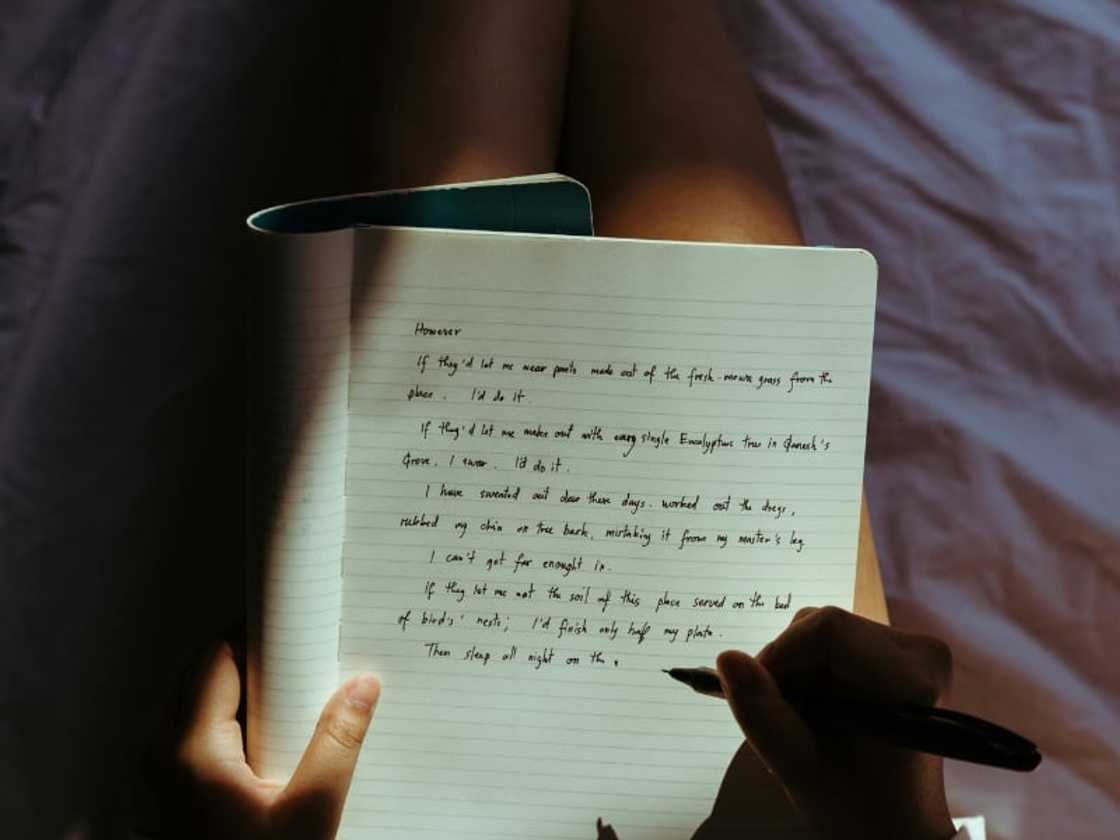How to write a diary entry: A simple guide for beginners
A diary is a valuable tool for expressing oneself freely in writing. It is a canvas reflection of your inner world and an effective way to document one's thoughts, feelings, and experiences. The recordings should resonate with you. This article gives a comprehensive guide on how to write a diary entry and tips to make it meaningful.

Source: Getty Images
TABLE OF CONTENTS
When it comes to writing a diary, there is no one-size-fits-all approach, which is essential for giving it a personal touch. Keeping a record of your experiences helps to preserve memories and is vital in self-discovery and personal development. Personal diaries left behind by individuals can also be instrumental in solving mysteries.
How to write a diary entry: about the format
A diary is personal property and can be styled as you see fit. You can choose to document your life in a book, which is a classic and timeless option. Writing has therapeutic benefits since it allows you to connect deeply with your thoughts.
In the modern day, digital diary apps are prevalent and can be kept secure using a PIN, passcode, or biometrics like fingerprints and face recognition. Digital apps are versatile and can be accessed from multiple devices. It is also easy to customize by adding video, audio, and pictures.

Source: UGC
The general format of a diary can have the following segments;
- Date and day: A standard diary should begin with the date and day at the top of the page. This is helpful for ensuring your entries are in chronological order and provides context.
- Time: You should include the time when you are making the entry. This allows you to capture the moments associated with that particular period.
- Salutation: Most diaries start with the salutation, 'Dear Diary', but you can name your diary and address it like a person. The name you choose should resonate with you and symbolize the secret you share with your diary. Address it like you are writing to a friend or confidant.
- Body: You explore your inner world within this section. Express yourself openly and truthfully. Think about experiences, chats, and emotions you felt. Use vivid words to paint your mindset's picture. The body can have sections that describe your emotional state, highlights of the day, and thoughts and reflections.
- Closing: End your entry with a personalized closing statement. It could be a summary of your day, a resolution, or a hopeful thought. You can also have a brief statement like 'Goodbye for now' or 'Until then'.
- Signature: Sign off with your name or a pseudonym. A signature provides closure to your diary entry, signifying that you have finished expressing your thoughts and experiences for the day.

Source: UGC
An example of how to write a diary entry
Here is a sample of a personal diary based on the above format;
March 20, 2025 (Friday)
11.00 AM
Dear Diary,
My day started with crisp morning air. As I drank my coffee, I pondered about my week - deadlines, meetings, and quiet moments.
Work felt hectic. The presentation succeeded, pleasing my team members. But I had secret uncertainties. Was I doing sufficient work? Did I choose the right path?
At lunch, I went to the park. Sitting under an oak tree's shade, sunlight filtered leaves created patterns on my notebook pages. I wrote overheard snippets - kids' laughter, distant traffic's hum—life's simple yet beautiful moments.
For dinner, I made a dish - a handed down recipe from Grandma's cookbook. Cooking made the whole kitchen smell like old times. I remembered her little house from long ago.
After eating, I gazed out the window at the bright city lights. Thoughts drifted to last week's chat with my friend. I also thought about childhood summer vacations and dreams not yet achieved. The quiet room comforted me.
I wondered what tomorrow might bring. What would my journal entry say next? What unknown tales would arrive?
Until then,
Alico

Source: Getty Images
How to write a diary entry for school
A diary entry for school reflects what goes on in a student's life. It can have details of memories, emotions, and plans. It can have the general format highlighted above or give it a personalized touch. Here is a diary entry sample for a student's first day at school;
July 2, 2025 (Monday)
5.00 PM
Dear Diary,
My junior year began today at Lungila High School. Anticipation was built all summer, and I woke excited yet nervous. I prepared last night, laying clothes and checking school supplies. But this morning, my stomach knotted. The sun barely rose, yet I wondered what lay ahead.
Activity buzzed around me as I stepped into the courtyard. Fresh grass scent, locker slams, friend reunions. Typical school sights and sounds. Possibility and nerves hung in the air.
I strolled through the hallways, a surge of anxiety washing over me. Could I locate my classes promptly? How would I connect with my new peers? Familiar faces from the last year greeted me warmly, yet numerous unfamiliar ones surrounded me. My heart raced.
Mrs. Clark, my history instructor, radiated a warm, commanding aura that instantly captivated me as she distributed the syllabus. I also encountered Alex, a fellow junior and soccer enthusiast, with whom I exchanged pleasantries before parting ways to our respective classes.
My schedule holds both fun and worry. Math, reading, science—these classes lie ahead. But there are new friends, surprises, and chances to grow too.
Goodbye for now,
Nicholas
How to write a diary entry in Afrikaans
A diary can be written in any language, including Afrikaans, as long as you understand it and you feel comfortable expressing yourself in it. There is no restriction when it comes to choosing the language to use.

Source: UGC
Tips on how to write a meaningful and engaging diary entry
Here are some tips to help you create meaningful diaries;
- Choose the correct format for you: This can be a physical book or a digital diary.
- Set the scene: This includes adding the date, time, and location for context and mentioning your current mood. You can also include an event that you think should be explored further.
- Be honest and open: Write candidly about your struggles, emotions, and triumphs without fear of judgment. A diary is your safe space, and being honest allows you to connect with your inner self and provide a genuine reflection of your experiences.
- Relate events in chronological order: It is crucial to start with events that happened earlier in the day and then progress to later events. You can use linking words to connect your thoughts and create a coherent flow.
- Be brief and vivid: It is crucial to be concise but vivid when describing events. Ensure the paragraphs are well thought-out by capturing the essence of your experiences without including unnecessary details.
- Track personal growth: You can reflect on personal growth and development by addressing questions that may arise during your diary-writing journey. Ensure you document your progress, celebrate achievements, and identify areas where you would like to grow.
- Incorporate dialogue and inner thoughts: Bring your experiences to life by including snippets of dialogue or your inner monologue. Sharing thoughts and reactions adds depth to the diary entry.
- Be consistent: It is essential to pick a specific time each day to write in your diary. Consistency helps develop the habit and ensures you capture a variety of experiences over time.
- Ensure privacy and security: Whether you are using a traditional pen-and-paper diary or a digital format, it is crucial to prioritize its security and privacy. A diary is your personal space that should be protected with care.
- Write in the first person: Writing in the first person allows you to have a personal approach by directly expressing how you feel. It makes it easier to connect with your emotions and create a meaningful record of your life.
- Write in the past tense: A diary is based on reflections and documents things that have already occurred.

Source: UGC
FAQs
Methods of diary entry have evolved, but their purpose has been consistent. Whether you are documenting your day at work, at school, or other events in your personal life, understanding the importance of a diary entry is crucial. Here are some frequently asked questions on the concept.
What is a diary entry?
A diary entry is a type of journal entry or a personal record that captures how you feel and the things you have experienced during a specific day. It is a platform that allows you to express yourself, share your reflections, and highlight significant events.
How should you start a diary entry?
There is no specific way to start your diary entry. Generally, you can include things like date, time, day, and location.
How do you structure a diary entry?
You should structure the diary entry in a way that organizes your thoughts and creates a coherent record of experiences and emotions. There is no standardized way to make the entries, but it should have the date, time, salutation, body, closing sentiments, and sign-off.
What should you write in your diary?
Your diary can document various things about your life, such as;
- Daily experiences
- Emotions and feelings
- Goals and aspirations
- Observations and reflections
- Dreams and hopes
- Challenges and possible solutions
- Personal growth
How many paragraphs are there in a diary entry?
There is no fixed number of paragraphs to include in your diary entry. Various factors determine the number and length of paragraphs, such as the content being documented and the style of writing. It is essential to do what is appropriate for you.
How do you end a diary entry?
Generally, the ending should have a closing summary, a closing line, and a signature. You can customize the ending with whatever fits the content of your diary and wrap up your thoughts.

Source: UGC
Learning how to write a diary is an essential practice that everyone should embrace. It not only serves as a record of your daily life but also incorporates a structured approach to personal development.
DISCLAIMER: This article is not sponsored by any third party. It is intended for general informational purposes only and does not address individual circumstances. It is not a substitute for professional advice or help and should not be relied on to make decisions of any kind. Any action you take upon the information presented in this article is strictly at your own risk and responsibility!
READ ALSO: 17 most famous explorers ranked and their legendary routes
Briefly.co.za published the 17 most famous explorers. Legendary explorers are known for their daring journeys across oceans and landmasses to discover the unknown. Some of the explorers lost their lives along the way.
Various exploration periods are documented, including the Ancient Exploration, the Age of Discovery, Polar Exploration, and Colonial Exploration. Advancements in technology have enabled modern-day deep-sea and space exploration that aims to make life multi-planetary.
Source: Briefly News

